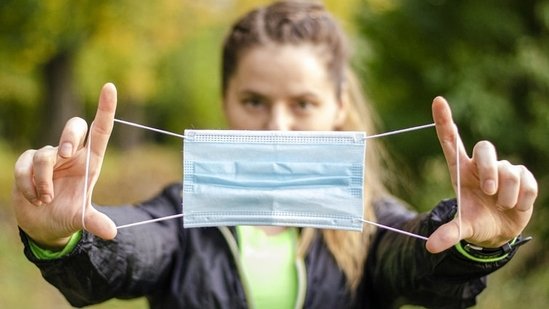![]()
With the highly infectious delta coronavirus variant spreading at an alarming rate, the World Health Organization in late June 2021 urged people to again wear masks indoors – even those who are fully vaccinated.
And on July 15, Los Angeles County, California, announced that it would again require masking up in public indoor spaces, regardless of vaccination status. This was followed by a recommendation – though not a mandate – from seven Bay Area counties for all to again don masks in public indoor settings.
Notably, the US Centers for Disease Control and Prevention has not yet taken a similar stance.
On July 12, National Nurses United, the nation’s largest professional association for registered nurses, called on the CDC to reconsider in light of the spike in new infections and hospitalizations across the country.
The Conversation asked Peter Chin-Hong, a physician who specialises in infectious diseases at the University of California, San Francisco, to help put into context the science behind these seemingly mixed messages.
What’s the science behind the WHO recommendation?
There is clear and mounting evidence that – though rare – breakthrough COVID-19 infections can occur, even in the fully vaccinated. This is particularly true with emerging variants of concern.
The CDC has been following these data closely. By mid-July 2021, nearly 60 per cent of the US population age 18 or older had been fully vaccinated.
Infections in those who are fully vaccinated are rare, and serious outcomes from COVID-19 in that population are even rarer – though they do still occur. However, the CDC stopped tracking nonhospitalised cases of COVID-19 for people with and without symptoms among fully vaccinated individuals on May 1, 2021.
The risk of infection leading to serious illness and death, however, differs starkly between vaccinated and unvaccinated people.
Maybe. Preliminary data suggests that the rise of variants like delta may increase the chance of breakthrough infections in people who received only their first vaccine dose. For instance, one not-yet peer-reviewed study found that a single dose of the Pfizer vaccine had an effectiveness of just 34 per cent against the delta variant, compared with 51 per cent against the older alpha variant in terms of warding off symptomatic disease.
But the data is more reassuring for those who have been fully vaccinated. After two doses, the Pfizer vaccine still provides strong protection against the delta variant, according to real-world data from Scotland and a variety of other countries; and in preliminary studies out of Canada and England, researchers noted only a “modest” decrease in effectiveness against symptomatic disease from 93 per cent for the alpha variant to 88 per cent for delta.
One recent preliminary report from Israel is sobering, however. Before the delta variant became widespread, from January to April 2021, Israel reported that the Pfizer vaccine was 97 per cent effective in preventing symptomatic disease. However, since June 6, with the delta variant circulating more widely, the Pfizer vaccine has been 64 per cent effective in preventing symptomatic disease, according to preliminary data reported by Israel’s Ministry of Health in early July.
And in another new report that is not yet peer-reviewed, researchers compared blood serum antibodies from people vaccinated with Pfizer, Moderna and J&J vaccines and found that the J&J vaccine lent much lower protection against delta, beta and other variants, compared with the mRNA-based vaccines.
As a result, the researchers suggest that J&J vaccine recipients would benefit from booster immunisations, ideally with one of the mRNA vaccines. However, this is a limited laboratory study that doesn’t look at whether real people got sick, and contradicts a peer-reviewed study that found the J&J vaccine was protective against delta eight months after vaccination.
In all reports and studies, however, vaccine efficacy is still very high against the delta variant in preventing hospitalisations and severe disease – arguably the outcomes we most care about.
All of this emerging data supports the WHO recommendation that even fully vaccinated individuals continue to wear masks.
Most of the world still has low vaccination rates, uses a range of vaccines with variable efficacy at preventing infection and has different burdens of circulating SARS-CoV-2 virus. In this context, it makes sense that the WHO would give a conservative recommendation to mask up for all.
Who’s actually protected by masking recommendations?
The WHO’s latest call for fully vaccinated people to continue wearing masks is primarily intended to protect the unvaccinated – which includes kids under age 12 who are not yet eligible for vaccines in the US Unvaccinated people are at a substantially higher risk of getting infected with and transmitting SARS-CoV-2, and of developing complications from COVID-19.










